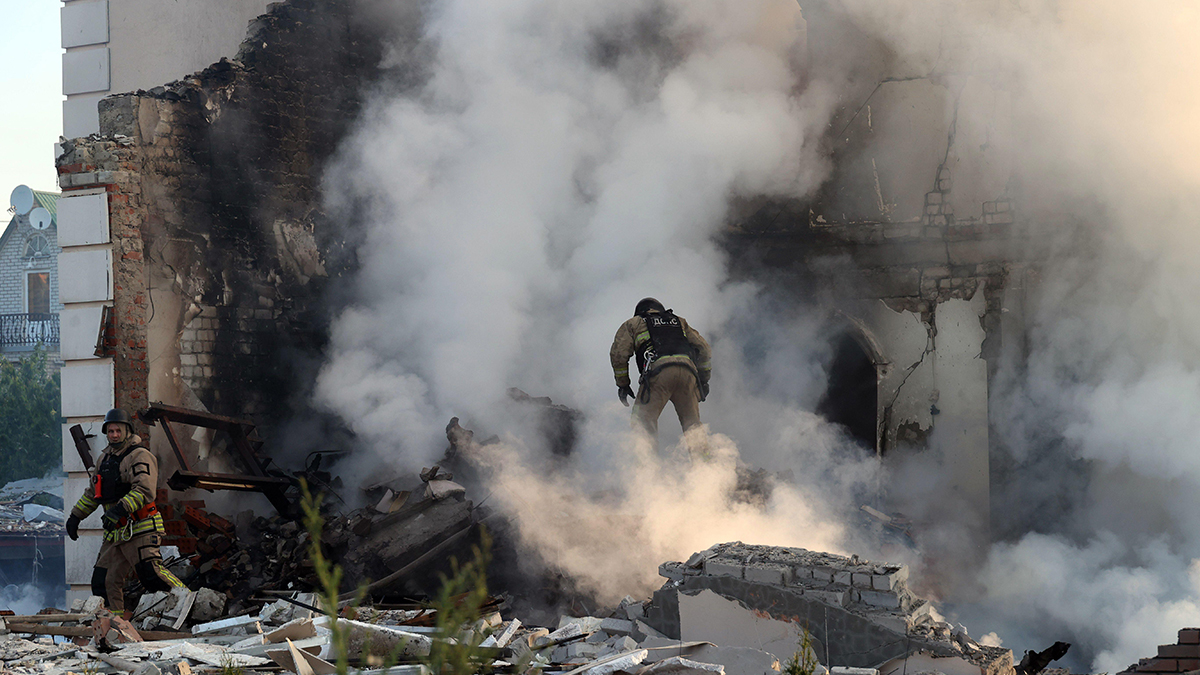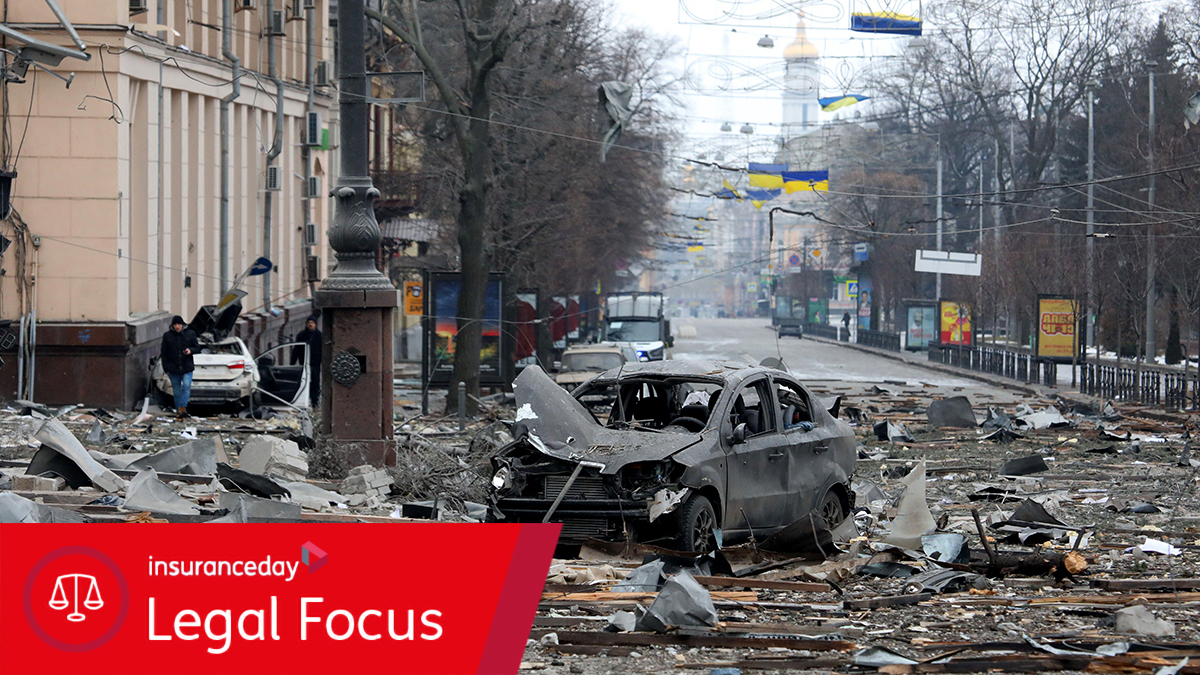Insurance ‘one of five key elements’ to rebuild Ukraine
Penny Pritzker outlines US priorities ahead of Ukraine Recovery Conference in Berlin
Without a robust insurance market, robust investment is not possible, US special representative for Ukraine’s economic recovery says
To ensure a lasting victory over Russian aggression, the international community must help Ukraine tackle five key issues, US special representative for Ukraine’s economic recovery, Penny Pritzker, told a meeting of the Council on Foreign Relations (CFR) this week.
Pritzker stressed providing air defence systems; fostering an anti-corruption culture; supporting government planning for investment; enabling insurance and risk management; and accessing sufficient capital must underpin discussions at the Ukraine Recovery Conference in Berlin on June 11 and 12.
“Taken together, these five essential elements can be rocket fuel that powers not just Ukraine’s true economic recovery, but also its journey to become a prosperous, democratic, independent country, integrated into the EU and Nato, which is exactly what its people crave,” Pritzker said in televised remarks.
Cause for optimism
A former US secretary of commerce and a longstanding member of CFR, Pritzker has visited Ukraine three times in the past six weeks, including joining the US secretary of state, Antony Blinken, in Kyiv in mid-May.
It was “undeniable”, she said, delays to security and economic assistance had led to a situation in which Ukraine had “lost ground” on the battlefield over recent months.
Since March 22 Russia’s president, Vladimir Putin, had “really doubled down on his cruelty”, she added, by stepping up military attacks on Ukraine’s energy infrastructure, laying siege to Kharkiv and seeking to “break the psyche” of its population by intensifying the shelling of hospitals, schools and homes in towns neighbouring Ukraine’s second-biggest city. For these attacks, Putin relies on his “dark alliances”, Pritzker said, by using Iranian drones, North Korean artillery and Chinese satellite imagery.
 Firefighters search the ruins of a building hit by a Russian missile in Kharkiv, Ukraine this month
Svet Jacqueline/ZUMA Press Wire/Alamy Stock Photo
Firefighters search the ruins of a building hit by a Russian missile in Kharkiv, Ukraine this month
Svet Jacqueline/ZUMA Press Wire/Alamy Stock Photo
“And yet, amid the dark headlines, there is real reason for optimism towards Ukraine, due to the facts and trends we have seen but the media do not often capture,” she added. In the approach to the conference in Berlin, it is important to “take heart” from these trends because they show “belief in Ukraine is not based on a Pollyannaish fantasy, but on the reality as we see it at play”.
In the 31 days since US president, Joe Biden, signed supplemental legislation, the US has “flooded” Ukraine with weapons and equipment, including “a couple of billion dollars” in munitions. “The democratic world is also there with us,” Pritzker added, pointing to further pledges to supply military equipment by Czechia, the UK, Germany and Australia. “Ukraine is wasting no time in putting this wave of support into action,” she said, adding its new conscription law was “difficult but absolutely necessary”. This is on top of Ukraine’s “huge success” in the Black Sea, where it has “pinned back” Russia’s fleet, and in “by and large” resisting a much larger force than itself along the 600-mile frontline.
Managing risk
Managing the risks from investing in the war-torn country is “already happening”, Pritzker stressed. The US International Development Finance Corporation is active and expanding its political risk portfolio for Ukraine, while the European Bank for Reconstruction and Development is leading the development of a facility to provide coverage against war-related risks.
The private sector is also involved, she added. Marsh McLennan’s Unity facility, launched in November 2023, is a $50m war risk insurance programme covering ships transporting grain through the Black Sea. “It’s one of the main reasons Ukraine’s Black Sea export routes have now expanded to pre-war levels, getting to 13 million tonnes of exports in April alone,” she said.
“But more must be done. Ukraine’s insurance premium market is just 3% of Poland’s. We are pushing for new lines of war risk insurance for energy, cargo, land transportation and elsewhere. In fact, in Berlin, we plan to announce ways to put new capital to work to provide war risk insurance for small- and medium-sized businesses. We all know, without a robust insurance market, robust investment is not possible.”
Ukraine is taking “important strides” economically. For example, its defence industrial base has increased the number of drone manufacturers from nine to more than 200. Cyber, robotics and demining expertise is “skyrocketing”, as live data from the battlefield helps Ukraine’s defence industries reduce the time needed for research and development of new technologies from years to weeks.
The leaders of American defence companies “literally marvel”, Pritzker said, at the innovation of Ukraine’s defence production, including its ability to combine technologies, such as precision missiles, drones and armoured vehicles, with US, Soviet and European parts to create whole new systems.
She continued: “It is this kind of creativity that is putting Ukraine’s defence companies at the leading edge of modern warfare technology. In fact, three US defence companies are working right now with their Ukrainian counterparts and us to co-produce low- and medium-calibre munitions made in and for Ukraine. Another is working on the very first joint venture between a US and Ukrainian defence company.”
The US wants to “unleash” more joint Ukrainian-US defence production “on Ukrainian soil”, she added, which is why a $2bn first-of-its-kind defence enterprise fund has been announced to provide more financing for production, repair and maintenance.
Bigger picture
The bigger economic picture is also encouraging, Pritzker said. Despite the war and having 17% of its territory occupied, Ukraine’s GDP grew 5% in 2023 and is on track to grow another 4.5% this year. Investment is up 17%, tax revenues “surged” 25% in January and more than 37,000 new businesses were registered in Ukraine in 2023 – more than in 2021, a year before the war.
“US companies beyond the defence sector are helping to co-author this recovery. McDonald’s added more stores in Ukraine and served more than 100 million Ukrainians just last year, sourcing 70% of its beef, dairy, vegetables and sunflower oil from inside Ukraine,” Pritzker said. Archer Daniels Midland and Cargill are investing in agricultural projects and reinvesting profits back into Ukraine’s “rich black soil”.
“Things are happening and that’s why there are more than 50 US companies that are going to be in Berlin for the recovery conference to talk about their investments and even expansions in Ukraine,” she said.
Despite all these positive points, Ukraine’s coalition of support must not be naive about the challenges the country faces, on and off the battlefield. “We have to be clear-eyed about what it will take for the country to win not just the war but also set itself up for the future.”
Kyiv has become Ukraine’s “economic beacon” thanks to the protective umbrella of air defences, she said, “and the same is starting to happen in Odesa”. To create jobs that draw back the Ukrainian diaspora and attract private sector investment, it is essential ways to provide sufficient air protection to Ukraine’s other centres of commercial activity, like Kharkiv, Dnipro and Lviv, can be found. “Security is essential to attracting large-scale investment. We all know that, but it takes a lot of work to make it a reality,” she said.
Anti-corruption culture
Defence against corruption was as important as military defence, she continued. That means a judiciary protected from outside interference; a press free from political influence; digital customs and other tax collection systems; independent, empowered, well-resourced anti-corruption investigators, prosecutors and judges; and strengthening the rule of law for everyone.
“When I speak to American CEOs, particularly those in the most crucial sectors like defence and energy, the first point they raise with me, after asking about the war, is always the need to fast-track reforms and address corruption,” Pritzker said. “American taxpayers and Congress also justifiably demand reform. I’m pleased to report Ukraine has made progress on its reform agenda, including making some very tough decisions. In just the past six months, for example, Ukraine has passed legislation regarding asset declaration, anti-monopoly regulation, judicial discipline reform and corporate governance. I truly believe these efforts and more are essential to change the culture in Ukraine but they will ultimately be just as much a part of the Zelensky government’s legacy as winning the war itself.”
“When I speak to American CEOs, particularly those in the most crucial sectors like defence and energy, the first point they raise with me, after asking about the war, is always the need to fast-track reforms and address corruption… I’m pleased to report Ukraine has made progress on its reform agenda”
Penny Pritzker
US special representative
Alongside supporting Ukraine to strengthen its defences and deepen its reforms, the international community must also enable the country to prioritise and prepare projects for investment and reconstruction. The World Bank estimates the cost to rebuild Ukraine is $500bn.
“There has never in history been such a significant need,” Pritzker said. “Unlike the Marshall Plan, where one actor, the US, was driving the reconstruction of many countries across western Europe, this is a case where many countries, businesses and people are driving the reconstruction of one nation: Ukraine. That makes co-ordination more challenging, although it allows us to bring to bear unprecedented amounts of funding, creativity, expertise and experience to the challenge.”
What is needed now is to “lash Ukraine’s ingenuity” to a cross-ministerial process that will prioritise and prepare the country for reconstruction. The mechanism for this needs to be “several things at once” – Ukrainian-led, community-driven and nationally co-ordinated. It must also be internationally backed, grounded in data and supported by the best engineering and planning expertise the world has to offer. “It’s a tall order, but creating this capability is essential,” Pritzker stressed.
Critical to Ukraine realising its forward-looking economy and its dream of becoming a member of the EU is the development of its energy, transportation and communication infrastructure. Without a cross-ministerial mechanism to co-ordinate the planning, engineering, resource management and financing of foundational investments, Pritzker said, it will not be possible for Ukraine to achieve its vision.
To tap into new sources of capital for the private sector’s reconstruction, ways must be found to unlock more catalytic and working capital. “The thirst is there,” she said, pointing out a major US bank had added 75 new business clients, which is a 15% increase in its client base since February of 2022. “But Ukraine needs so much more. There needs to be more lending through banks, through the international financial institutions and elsewhere at interest rates that recognise the risk, but yet also make investment profitable.”
In addition, for Ukraine’s reconstruction, there is a crucial step that must be taken as a “moral, legal and practical matter”.
Pritzker said: “Russia must be made to pay. Our Congress has given us the power to seize Russian assets in the US, understanding that what Putin has destroyed, Russia should and must pay for its rebuilding. And we intend to use this power, working with the G7, by pulling forward profits and interest on frozen assets, which is a first step. This can and will unlock billions of dollars and send a powerful message to Putin that time is not on his side.”



